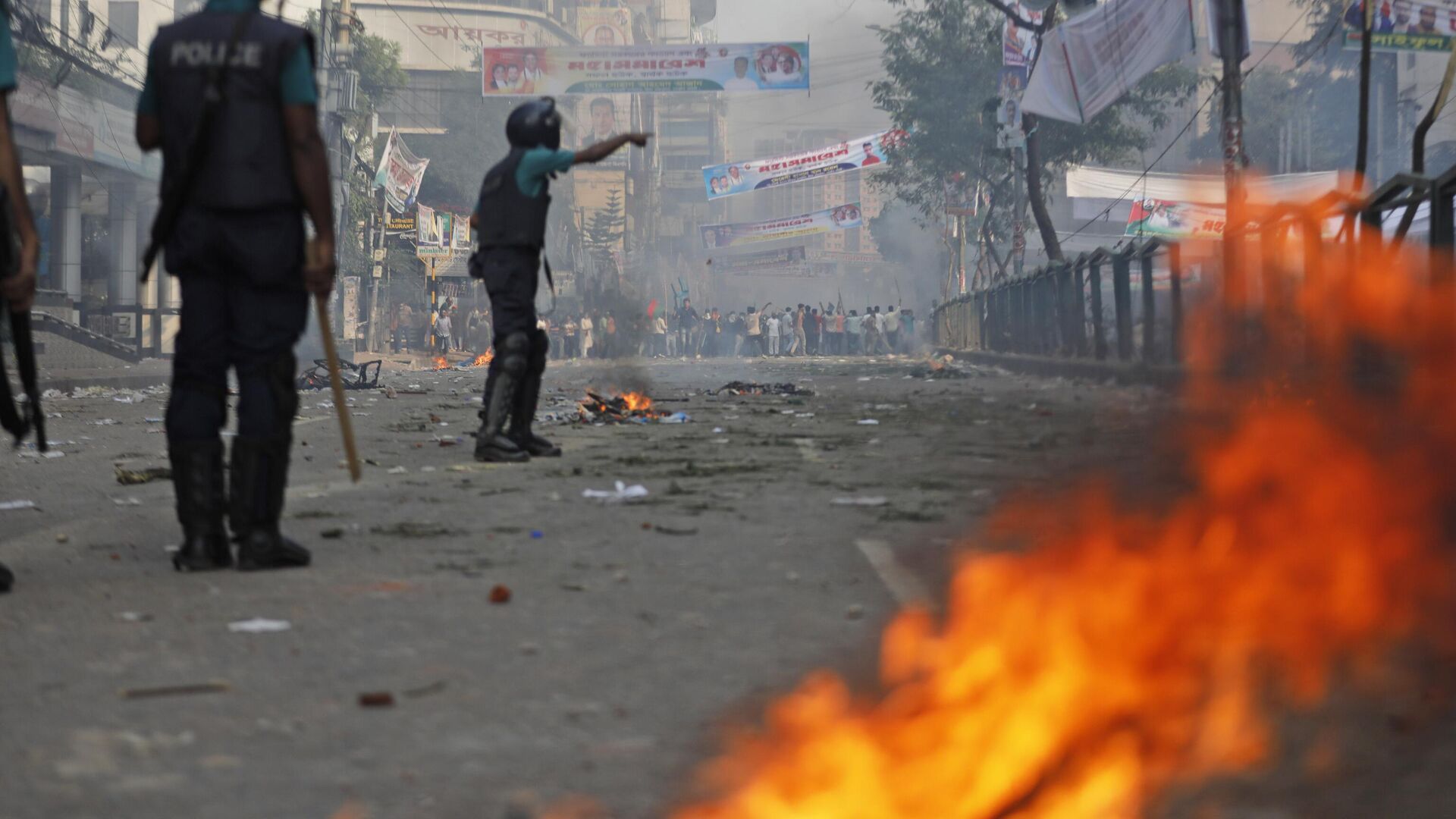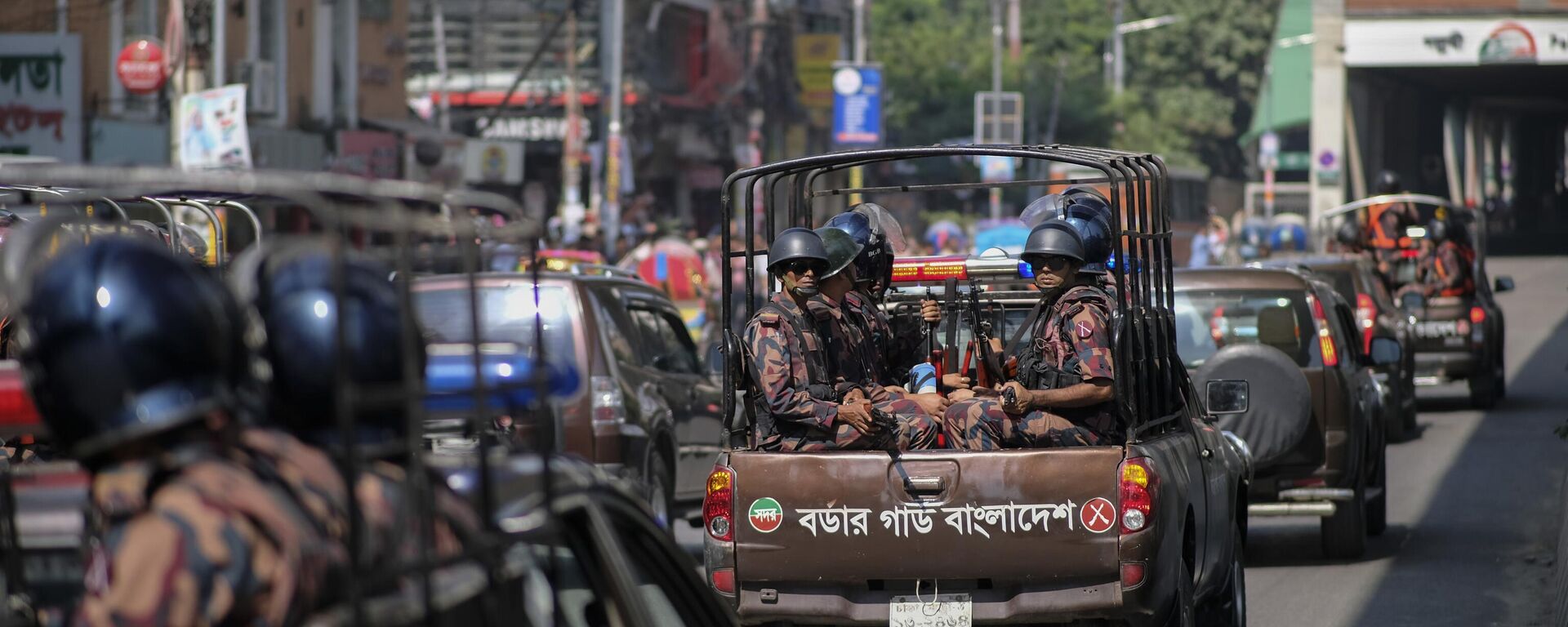Is US Inciting Regime Change in Bangladesh?
17:53 08.11.2023 (Updated: 18:22 10.11.2023)

© AP Photo / Mahmud Hossain Opu
Subscribe
Bangladesh's main opposition party, seen as a "proxy" for US, has called a two-day nationwide blockade of roads and railways, bringing the country to a virtual standstill.
There is widespread perception that the US government is looking to topple Bangladeshi Prime Minister Sheikh Hasina’s Awami League-led government by backing anti-government protests, former officials have told Sputnik India.
Squadron Leader (retired) Sadrul Ahmed Khan, a former deputy Serjeant at Arms at Bangladesh Parliament, said that the Biden administration’s apparent support for the opposition of Bangladesh Nationalist Party (BNP) and its Islamist allies is being compared to US’ backing of coup’ supporters in Ukraine during the Maidan Protests in 2014.
“There are fears that the US Ambassador (to Bangladesh) Peter Haas’ actions (seen as tacitly supporting BNP) in the past few months will destabilize not only Bangladesh, but the entire south Asian region,” asserted Khan, who is an official at Awami League.
The US has been critical of the Bangladeshi authorities for their crackdown on anti-government protestors calling for the resignation of Prime Minister Hasina in the lead-up to the federal election in January.
In September, the US State Department also slapped visa restrictions primarily targeting ruling party officials and law-enforcement officers for allegedly “undermining the democratic election process”.
The BNP-led protest on 28 October turned deadly, leading to nearly a dozen deaths. Around 8,000 opposition activists and leading politicians accused of inciting violence have been arrested by Bangladeshi authorities.
An American citizen claiming to be an emissary of Biden is believed to have visited the BNP office in Dhaka after the 28 October protest, though the US State Department has rejected the charge.
However, opposition parties have continued to demonstrate on the streets demanding Hasina’s resignation and the release of jailed activists.
Does US Use a 'Proxy' in Bangladesh?
Khan described the BNP as a “proxy” for American interests in Bangladesh.
“The US was not in favour of Bangladesh during the Liberation War of 1971. But over the years, the US has developed ties with Bangladesh,” he recounted.
The US opposed Bangladesh’s independence in 1971 by dispatching a task force of its Seventh Fleet to the Bay of Bengal. The US naval mission was forced to abort its mission after Moscow sent its Pacific Fleet warships to the region.
“On the other hand, Russia was with Bangladesh in 1971. Even after our independence, Russia helped to rebuild our war-torn economy. We remember the sacrifice of Russian Navy personnel who laid down their lives in the mine-sweeping operations during 1972-1974,” Khan recalled.
Explaining the historical trajectory of Bangladesh-Russia relations, the former Squadron Leader noted that the ties had been “constrained” after Awami League was ousted from power in 1975.
He noted that it was only in 1996, when Hasina first came to power, that the relationship got a “boost”.
“But, a super boost came in this relationship happened when Prime Minister Hasina visited Russia in 2015. Russia promised to invest in a nuclear electricity power plant in Bangladesh. Bangladesh’s biggest defence purchase deal was also signed during that visit. The military hardware acquired from the deal is being mostly used in peacekeeping operations,” the former security official stated.
Last month, Dhaka received its first shipment of uranium to power the Rooppur Nuclear Power Plant (NPP), the country’s first civilian nuclear facility being built with a $11.3 billion Russian loan.
He noted that the Biden administration has been vocally critical of Hasina over the jail sentence handed down to Muhammad Yunus, a Nobel laureate known in the West for pioneering micro-finance in Bangladesh.
Highly decorated in the US, Yunus has faced criticism in Bangladesh for ripping off poor in the name of cheap loans.
"When the Biden administration took charge, the US side got hyper about the Yunus issue again. They have put pressure on Bangladesh to stop trials against Professor Yunus. They asked to cancel judicial proceedings against Professor Yunus on tax fraud, money laundering and several cases. But Bangladesh government has refused to heed these calls by the US," stated Khan.
Only India and Russia are Bangladesh’s Historical Partners: Ex-PM Advisor
Iqbal Sobhan Chowdhury, Prime Minister Hasina’s former advisor, told Sputnik India, that most of Dhaka’s foreign relationships were governed primarily by “economic interests”.
“There are just two countries with which we have deep historical and political bonds—India and Russia—because both supported us during our Liberation War,” he proclaimed.
He said that with most of the other countries, including with the US and China, Bangladesh’s relationship was purely of an “economic nature”.
Chowdhury reckoned that Bangladesh had progressed on all economic and political indicators under the Awami League. Hasina became the Prime Minister in 2009, having won her fourth term in power in 2018.
“We have made great strides in infrastructure, technology and economic parameters under Hasina. We will get technology from wherever it is available," said Chowdhury.
In spite of the global economic slowdown in the wake of the Covid pandemic and the spillover effects of the Ukraine crisis, Bangladesh has consistently clocked an GDP growth of over six percent since 2021.
According to Asian Development Bank (ADB), Bangladesh’s GDP growth is projected to be six percent and 6.5 percent this and next year respectively.
Chowdhury echoed concerns that the US Ambassador’s apparent backing of violent opposition protests wasn’t good at all for the country’s “political stability”.
“The US Ambassador’s role in Bangladesh is very unpopular and it is in complete violation of Vienna Convention. He is seen taking sides in domestic politics. Rather than trying and heal political divides, he is exacerbating it,” the former PM advisor complained.


